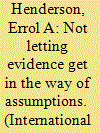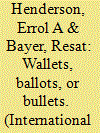|
|
|
Sort Order |
|
|
|
Items / Page
|
|
|
|
|
|
|
| Srl | Item |
| 1 |
ID:
120447


|
|
|
|
|
| Publication |
2013.
|
| Summary/Abstract |
This article addresses the centrality of racism in international relations (IR) theory; specifically, in realism and liberalism, two of the most prominent paradigms of IR. It examines the extent to which these major paradigms of world politics are oriented by racist-primarily, white supremacist-precepts that inhere within their foundational construct, namely, anarchy. I maintain that due to the centrality of anarchy-and other racially infused constructs-within these prominent paradigms, white supremacist precepts are not only nominally associated with the origins of the field, but have an enduring impact on IR theory and influence contemporary theses ranging from neorealist conceptions of the global system to liberal democratic peace claims, and constructivist theses as well.
|
|
|
|
|
|
|
|
|
|
|
|
|
|
|
|
| 2 |
ID:
067167


|
|
|
| 3 |
ID:
153674


|
|
|
|
|
| Summary/Abstract |
This article briefly examines the contributions to International Relations (IR) theory of W.E.B. Du Bois and Alain Locke. Taking as a point of departure the recent work of Robert Vitalis1 on the ‘Howard School’ of IR of which these two were prominently associated, I both embrace and challenge Vitalis’ thesis on the importance of these two African American scholars to the academic field of IR. Embracing Vitalis’ invaluable articulation of the Howard School’s critique of white supremacist arguments prevalent in IR at its founding and well beyond, I also challenge Vitalis’ apparent disassociation of these scholars from the formulation of IR theory. Instead, I discuss how Du Bois and Locke provided some of the earliest theoretical arguments on the role of ‘national imperialism’ in modern war, as well as theses of cultural change and its impact on international relations.
|
|
|
|
|
|
|
|
|
|
|
|
|
|
|
|
| 4 |
ID:
120872


|
|
|
|
|
| Publication |
2013.
|
| Summary/Abstract |
We examine the extent to which wealth, democracy, and/or relative military capabilities contribute to victory in interstate war. Examining contingency tables, we find that states with greater military capabilities are more likely to win their wars whether they are wealthier or democratic, and democratic states perform marginally better than wealthier states in war. Probit analyses indicate that although each of the variables has a robust and positive impact on war victory, relative capabilities has the strongest substantive impact, followed by wealth, then democracy. Hazard analyses reveal that states with greater military capabilities fight shorter wars than either democracies or wealthier states, and controlling for capabilities and wealth, the relationship between democracy and war duration is not significant, which challenges the view that democracies have a unique propensity to fight shorter wars. We also find that the democratic victory phenomenon is not universal, but is contingent on the placement of a single country, Israel, in the Western or non-Western democracy category. In sum, our analyses indicate that although each of the three factors contributes to war victory, relative military capability is the most powerful, consistent, and robust predictor to victory in interstate war.
|
|
|
|
|
|
|
|
|
|
|
|
|
|
|
|
|
|
|
|
|